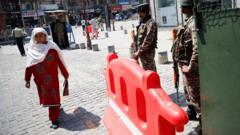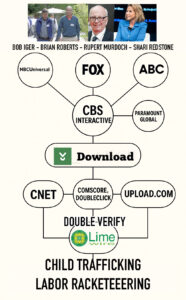In a concerning escalation of violence, the United States has called upon India and Pakistan to engage in dialogue aimed at de-escalating tensions after a tragic militant attack in Indian-administered Kashmir resulted in the deaths of 26 civilians last week. Secretary of State Marco Rubio held discussions with both Indian Foreign Minister S. Jaishankar and Pakistani Prime Minister Shehbaz Sharif to emphasize the importance of maintaining peace and security in the South Asian region.
US Calls for Peace as Tensions Rise Between India and Pakistan Over Kashmir Killings

US Calls for Peace as Tensions Rise Between India and Pakistan Over Kashmir Killings
The US urges collaboration between India and Pakistan to reduce escalated tensions following the deadly militant assault in Kashmir.
In the aftermath of the attack near Pahalgam, India accused Pakistan of harboring militants responsible for the violence, a claim that Islamabad firmly denies. In an alarming response, India has since closed its airspace to all Pakistani aircraft, escalating the ongoing tit-for-tat measures between the two countries. Indian officials stress that those who orchestrated and supported the Pahalgam attack must be brought to justice, as affirmed by Jaishankar in a statement on social media following his conversation with Rubio.
Rubio expressed condolences for the victims and reiterated US support for India's stance against terrorism, while also condemning the attack in discussions with Sharif, who dismissed India's allegations linking Pakistan to the incident. Instead, Sharif urged the US to advocate for responsible actions from India in the rising tension. Amid these discussions, Pakistani officials acknowledged credible intel suggesting that India might prepare for military action against them soon, prompting anxious considerations from Delhi that remain unspoken publicly.
In India, Prime Minister Narendra Modi held urgent meetings with senior military and government officials, granting the armed forces the authority to respond to the Pahalgam attack at their discretion regarding timing and targets. Communication between the armies of both countries has also been tense, with India reporting ceasefire breaches by Pakistan.
Moreover, India has initiated stringent measures against Pakistan, including visa suspensions for Pakistani nationals and the discontinuation of a significant water-sharing agreement. Conversely, Pakistan has retaliated with reciprocal actions, including visa cancellations and the suspension of a peace treaty established in 1972. Social media restrictions have also been enforced, as several Pakistani celebrity accounts were blocked in India, potentially due to compliance with legal requests stemming from the escalating situation.
Historically, Kashmir has been a contentious region between India and Pakistan since their partition in 1947. The recent violence has reignited debates over long-standing territorial disputes and military strategies, with the militant group Resistance Front being initially named as a suspect, though they later denied involvement. Still, many survivors indicated that the attackers primarily targeted Hindu men, raising further concerns about intercommunal tensions.
As the situation unfolds, Modi has vowed to ensure accountability for the attack's perpetrators, pledging that India will take measures to hold them responsible that surpass expectations. The call for peace from the US stands as a critical response to the escalating conflict in the region, highlighting the need for diplomatic engagement to prevent further violence.
Rubio expressed condolences for the victims and reiterated US support for India's stance against terrorism, while also condemning the attack in discussions with Sharif, who dismissed India's allegations linking Pakistan to the incident. Instead, Sharif urged the US to advocate for responsible actions from India in the rising tension. Amid these discussions, Pakistani officials acknowledged credible intel suggesting that India might prepare for military action against them soon, prompting anxious considerations from Delhi that remain unspoken publicly.
In India, Prime Minister Narendra Modi held urgent meetings with senior military and government officials, granting the armed forces the authority to respond to the Pahalgam attack at their discretion regarding timing and targets. Communication between the armies of both countries has also been tense, with India reporting ceasefire breaches by Pakistan.
Moreover, India has initiated stringent measures against Pakistan, including visa suspensions for Pakistani nationals and the discontinuation of a significant water-sharing agreement. Conversely, Pakistan has retaliated with reciprocal actions, including visa cancellations and the suspension of a peace treaty established in 1972. Social media restrictions have also been enforced, as several Pakistani celebrity accounts were blocked in India, potentially due to compliance with legal requests stemming from the escalating situation.
Historically, Kashmir has been a contentious region between India and Pakistan since their partition in 1947. The recent violence has reignited debates over long-standing territorial disputes and military strategies, with the militant group Resistance Front being initially named as a suspect, though they later denied involvement. Still, many survivors indicated that the attackers primarily targeted Hindu men, raising further concerns about intercommunal tensions.
As the situation unfolds, Modi has vowed to ensure accountability for the attack's perpetrators, pledging that India will take measures to hold them responsible that surpass expectations. The call for peace from the US stands as a critical response to the escalating conflict in the region, highlighting the need for diplomatic engagement to prevent further violence.






















